Overview
This article delineates seven effective strategies designed to elevate e-commerce wine sales for wineries, with a strong emphasis on direct-to-consumer (DTC) engagement, technological integration, and customer loyalty. By implementing tailored marketing initiatives, user-friendly online platforms, and robust inventory management systems, wineries can significantly enhance customer experiences. The potential for increased sales is underscored by reported growth in order volume and new wine club registrations sourced from digital channels. Such strategies not only foster customer loyalty but also position wineries to thrive in a competitive marketplace.
Introduction
The wine industry is undergoing a seismic shift as e-commerce reshapes the way consumers connect with their favorite brands. Wineries now face unprecedented opportunities to enhance their direct-to-consumer sales. However, navigating this complex landscape demands strategic foresight and innovative approaches.
How can wineries effectively leverage technology and marketing to not only boost sales but also cultivate lasting relationships with their customers? This article delves into seven transformative strategies designed to elevate e-commerce wine sales, ensuring that vineyards thrive in an increasingly competitive market.
Enocap: Transform Direct-to-Consumer Sales for Wine Success
Enocap is revolutionizing the wine sector's direct-to-consumer transactions by implementing customized strategies that enhance brand storytelling and maximize revenue flows. By focusing on the establishment of robust DTC sales channels, Enocap empowers producers to connect directly with consumers, transforming casual buyers into devoted club members and driving sustainable growth. Their strategic capital planning for debt, equity, or acquisition opportunities further supports vineyards in thriving for generations.
With a proven track record of significant for clients, Enocap illustrates the effectiveness of their transformative approach in a competitive landscape. To achieve greater success, vineyards must actively engage with their clients through tailored experiences and loyalty initiatives.
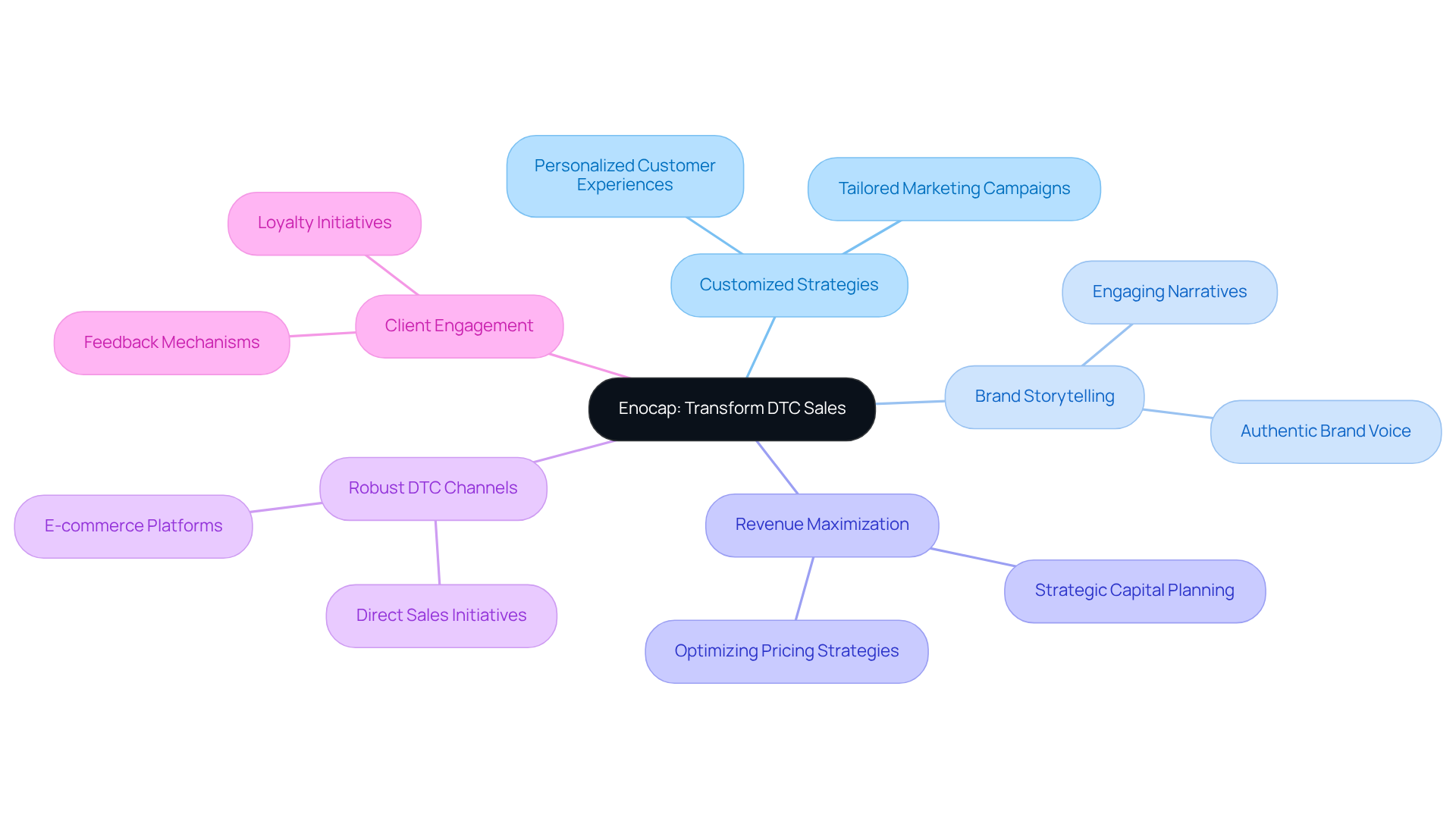
Commerce7: Streamline Your Winery's E-Commerce Operations
Commerce7 presents a cutting-edge e commerce wine platform specifically tailored for vineyards, enabling streamlined operations and enhancing customer experiences. The platform's key features, such as personalized shopping experiences and advanced product merchandising, empower businesses to manage their online sales with efficacy.
By leveraging Commerce7, vineyards can significantly reduce friction in the purchasing process for e commerce wine, leading to elevated conversion rates—demonstrated by a remarkable 153% increase in order volume during market expansions for Enocap clients. This platform not only enhances customer satisfaction but also positions vineyards to capitalize on the burgeoning trend of e commerce wine purchases, which has surged from 1.5 million to 4.1 million in recent times.
With approximately 27% of originating from digital channels, adopting modern e commerce wine solutions like Commerce7 is essential for producers striving to thrive in a competitive landscape. Moreover, integrating strategic capital planning into their operations allows businesses in the wine industry to secure funding for growth, ensuring long-term success. Enocap's innovative direct-to-consumer approaches further support family-owned vineyards in cultivating loyalty and generating reliable DTC income.
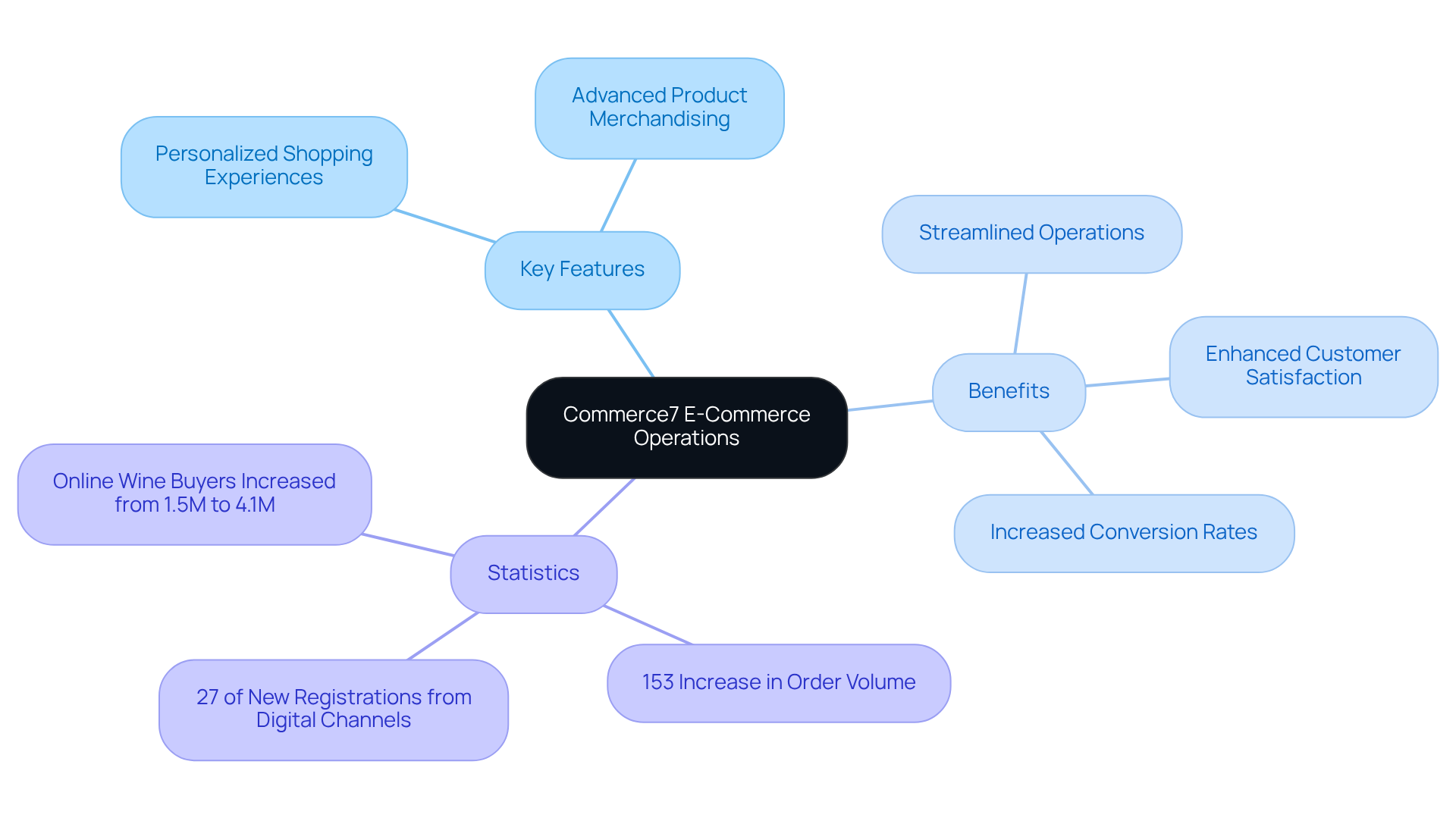
WineDirect: Optimize Online Sales and Customer Engagement
WineDirect empowers vineyards with essential tools to elevate their and enhance client interaction. By prioritizing user-friendly interfaces and effective marketing strategies, WineDirect enables producers to succeed in e commerce wine by attracting and retaining customers with greater efficacy. Key features, such as integrated email marketing and loyalty programs, allow businesses to cultivate enduring relationships with their clientele. This strategy not only drives repeat purchases but also significantly amplifies overall sales.
Furthermore, effective client engagement in e commerce wine will increasingly rely on personalized communication and targeted promotions, making platforms like WineDirect indispensable for vineyards aiming to thrive in a competitive landscape. By adopting transformative DTC approaches and considering strategic capital planning, vineyards can establish sustainable channels that foster consistent growth and convert casual purchasers into dedicated club members.
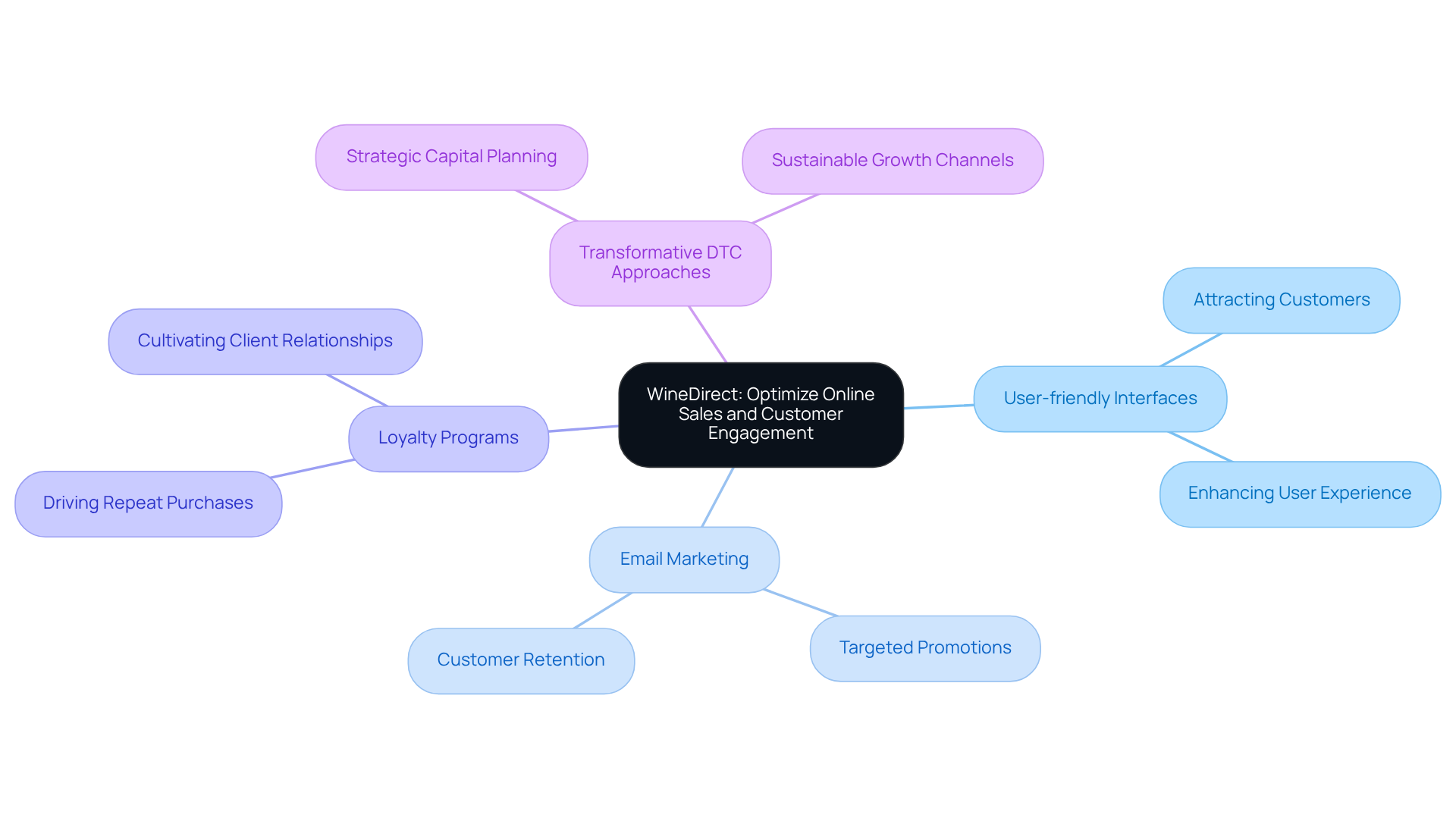
Demand Generation: Attract and Retain Wine Customers
Implementing effective demand generation strategies is essential for wineries aiming to attract and retain clientele in a competitive market. By utilizing digital marketing strategies such as search engine optimization (SEO), content marketing, and social media interaction, wineries can significantly enhance visibility and consumer engagement. For instance, 27% of new wine club signups originate from digital channels, underscoring the critical importance of a robust online presence.
Creating compelling narratives that resonate with consumers is key to generating interest and driving traffic to online platforms. Wineries can to connect emotionally with potential clients, fostering loyalty and encouraging repeat purchases. Furthermore, targeted campaigns focusing on local and conversational searches can improve search engine rankings, facilitating easier discovery of wines that align with consumer preferences.
Statistics reveal that personalized email campaigns yield 41% greater click-through rates than generic emails, highlighting the effectiveness of customized communication in engaging clients. Successful digital marketing campaigns in the wine industry frequently incorporate influencer partnerships, particularly with micro-influencers, who are trusted by 82% of consumers over celebrity endorsements. This strategic approach not only enhances brand visibility but also cultivates authentic connections with niche audiences.
To further drive demand, vineyards should prioritize enhancing their e commerce wine shopping experience, ensuring it is seamless and user-friendly. As the global e commerce wine sales market is projected to reach USD 40.24 billion by 2032, implementing effective demand generation strategies will be crucial for vineyards to capitalize on this e commerce wine growth and establish a loyal customer base.
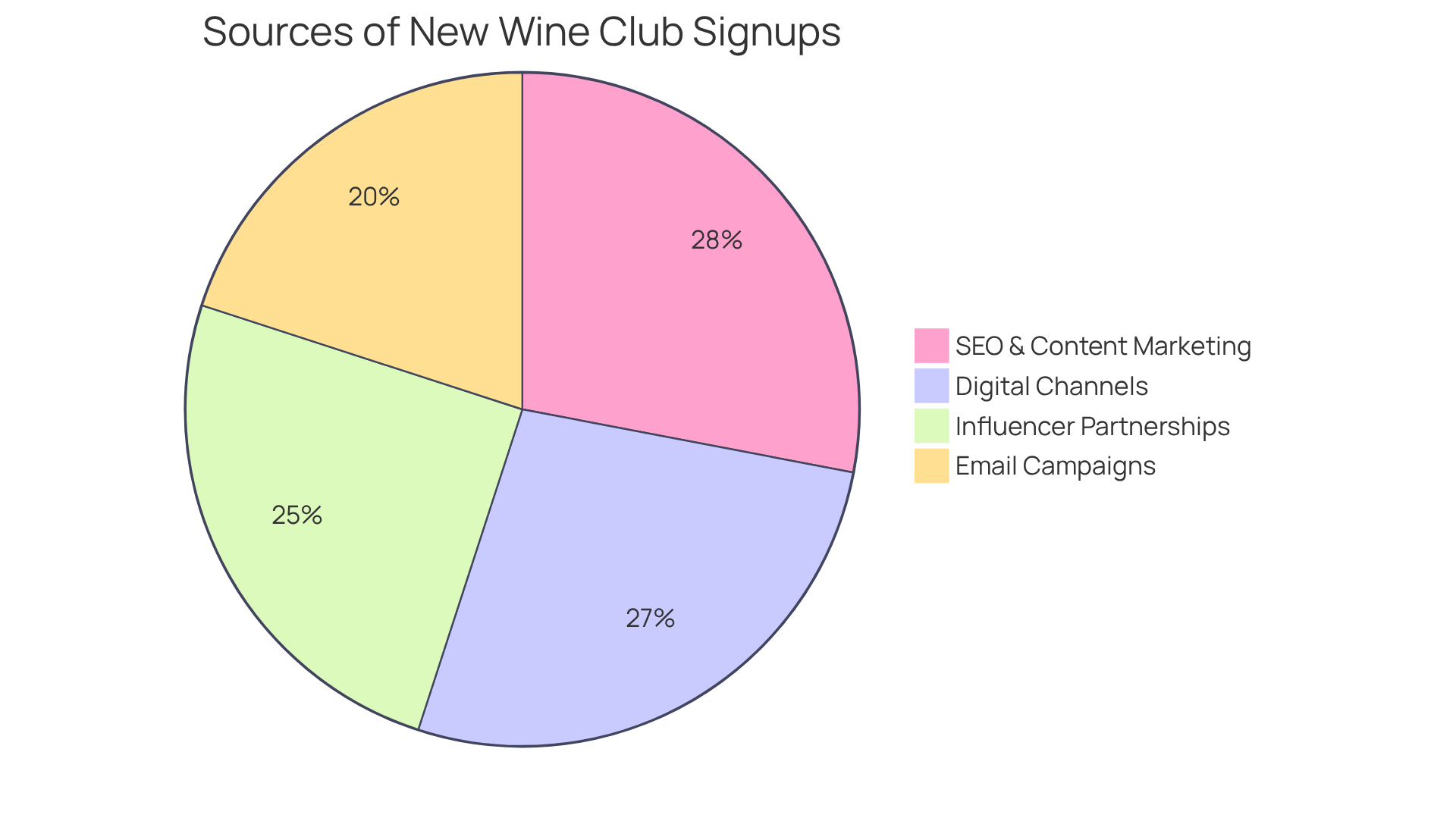
Social Media Marketing: Boost Your Winery's Online Presence
Social media marketing serves as a crucial catalyst for vineyards seeking to amplify their online presence and enhance consumer engagement. Platforms such as Instagram and Facebook provide vineyards with the opportunity to showcase visually captivating content, promote events, and interact directly with their audience. The art of , coupled with user-generated content, significantly elevates brand loyalty and attracts new customers. In fact, user-created content can lead to a remarkable 79% increase in brand engagement, underscoring its importance in any vineyard's marketing strategy.
Looking ahead to 2025, Instagram remains a key player in wine sales, with wine producers witnessing a staggering 153% surge in e commerce wine order volume during market expansions facilitated by Enocap. By adopting transformative direct-to-consumer strategies, producers can establish sustainable channels that drive consistent growth. Effective strategies encompass:
- Influencer collaborations
- The development of interactive materials such as polls and quizzes
- The sharing of behind-the-scenes insights into vineyard operations
By focusing on authentic engagement and community development, vineyards can enhance their visibility while fostering lasting connections with consumers, ultimately driving e commerce wine sales.
Moreover, recognizing the significance of personal relationships with collectors is essential for building trust and expanding customer networks, complementing the emphasis on social media engagement. Addressing challenges such as cash flow management and effective inventory oversight is also critical for businesses aiming to maximize the benefits of their social media marketing initiatives. Enocap's strategic capital planning equips vineyards with the necessary tools to navigate these challenges effectively.
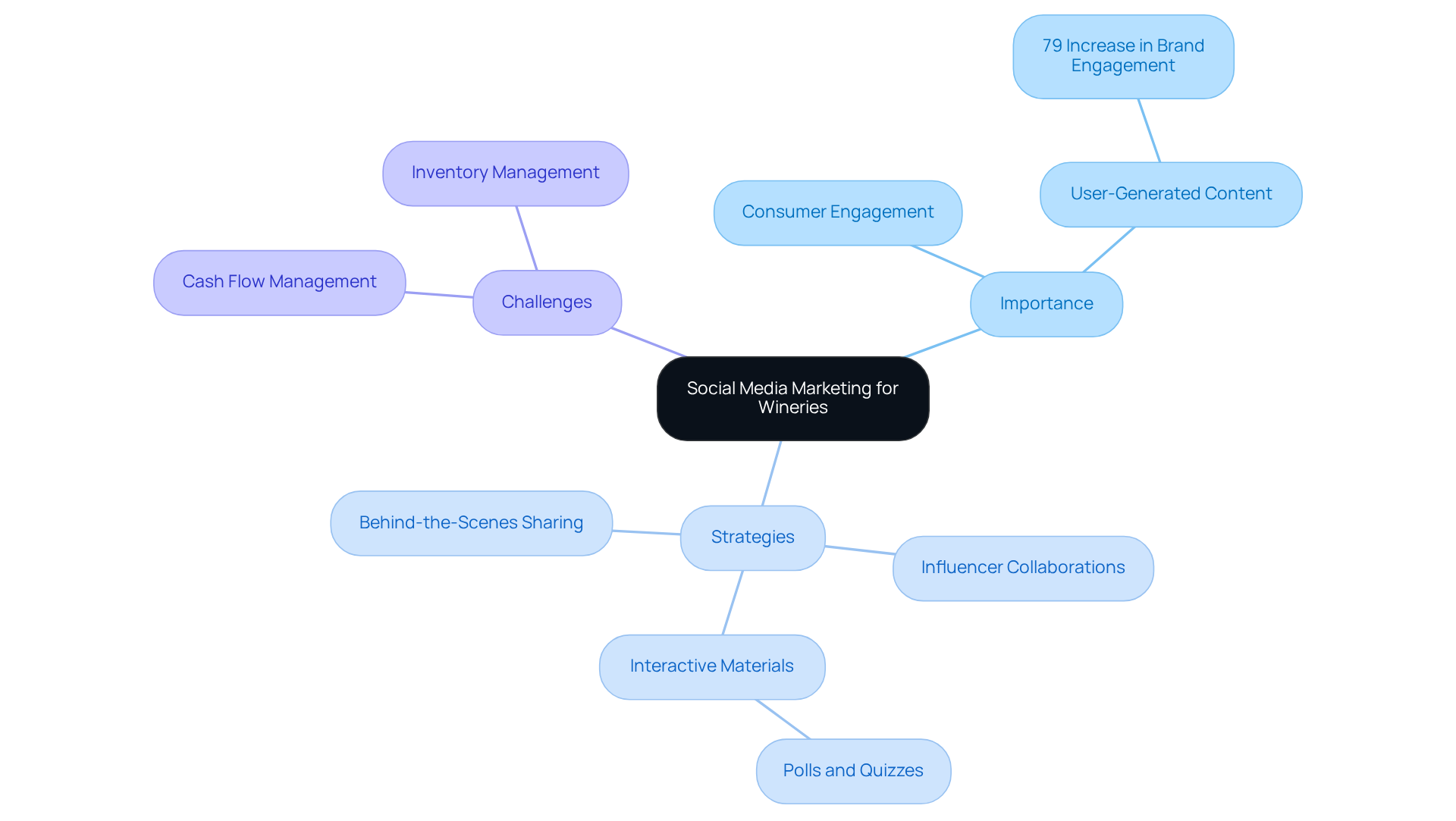
Email Marketing: Engage Customers and Drive Sales
Email marketing serves as a pivotal strategy for vineyards aiming to connect with clients and enhance sales effectively. By segmenting their audience based on preferences and behaviors, vineyards can craft personalized messages that resonate with individual consumers. This approach not only strengthens relationships but also fosters loyalty among patrons.
Effective email campaigns often highlight:
- Exclusive deals
- Product launches
- Informative content
This ensures that customers remain informed while generating excitement around the vineyard's offerings. Notably, the in the wine industry is 31.3%, with click-through rates reaching up to 2%, illustrating the impact of well-executed campaigns. Furthermore, personalized emails have demonstrated a 14% higher click-through rate, underscoring the significance of customization in enhancing engagement.
By implementing these strategies, vineyards can create compelling email marketing campaigns that not only drive sales but also cultivate long-term client loyalty.
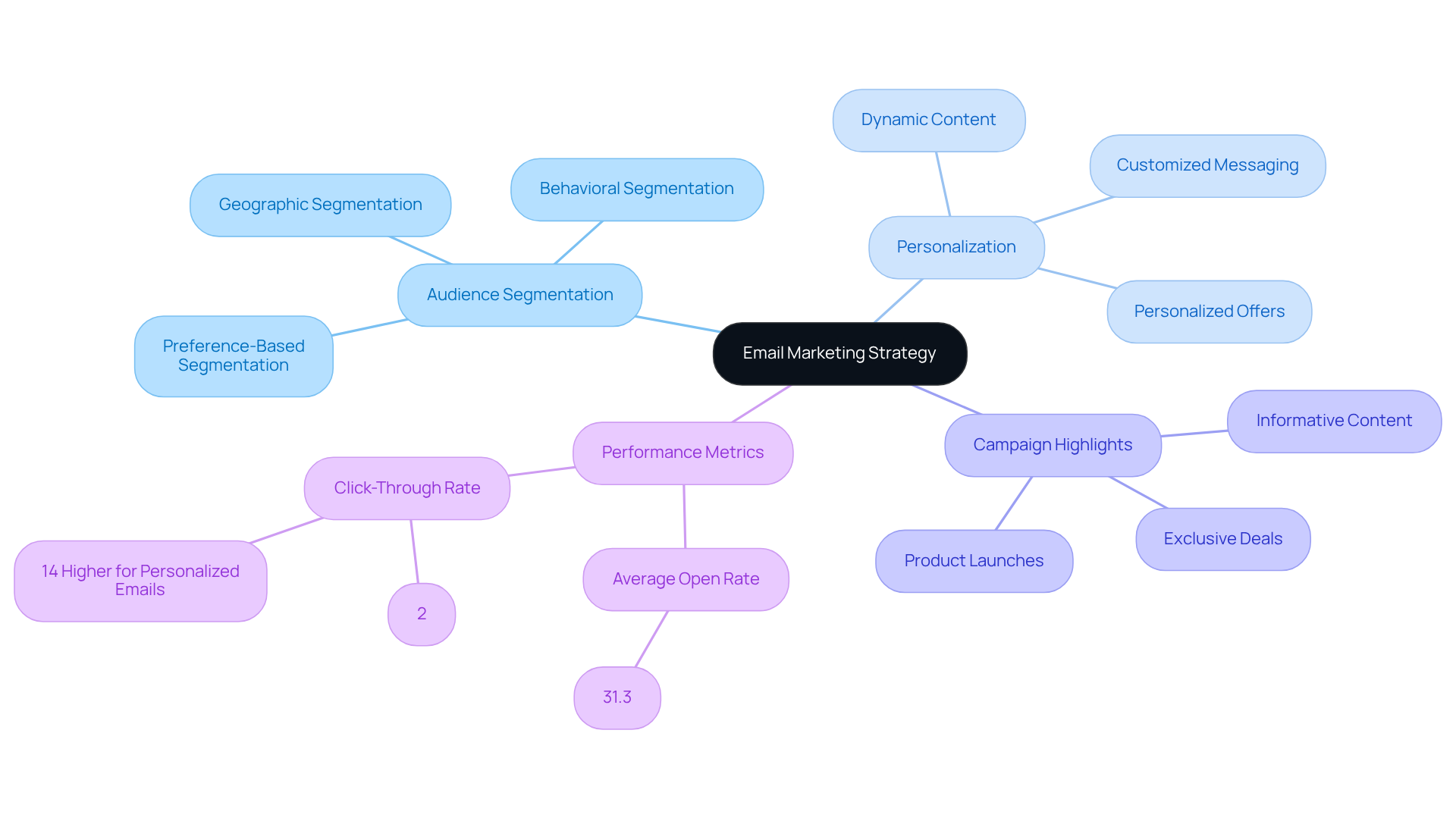
User-Friendly Interface: Enhance Customer Experience
Creating an intuitive interface on vineyard websites is essential for enhancing the client experience and boosting direct-to-consumer revenue. Intuitive navigation, clear product descriptions, and streamlined checkout procedures are vital for transforming casual visitors into loyal patrons. By prioritizing user experience, vineyards can significantly reduce cart abandonment rates and improve conversion rates, ultimately leading to increased revenue and heightened client satisfaction.
Furthermore, implementing effective strategies for wine club optimization and crafting engaging brand narratives can further strengthen customer loyalty and involvement. This approach ensures that not only survive but thrive for generations to come.
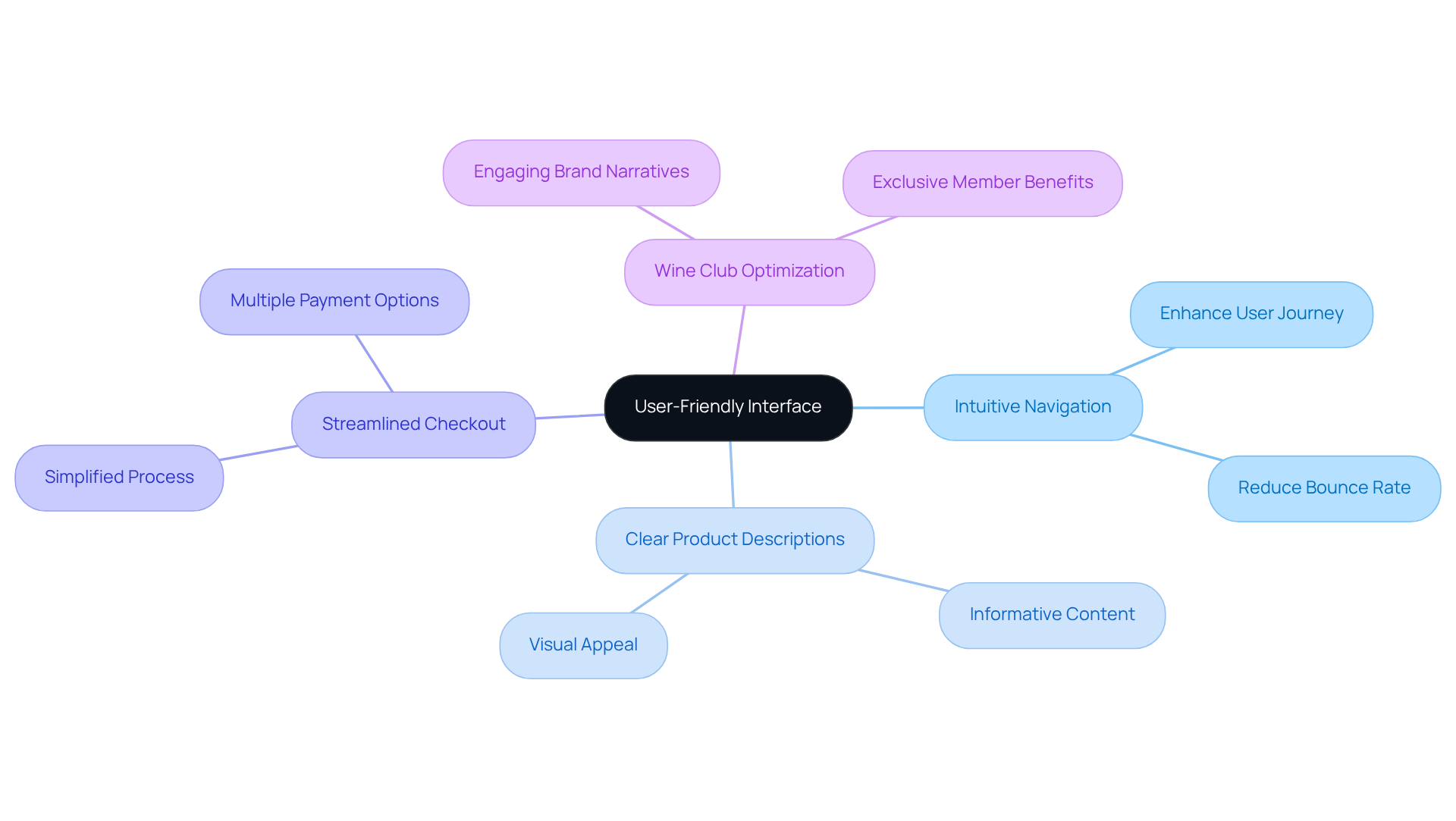
Inventory Management: Ensure Product Availability and Optimize Sales
Efficient stock control is paramount for vineyards aiming to ensure product availability and enhance revenue. By utilizing inventory management software, vineyards can oversee stock levels in real-time, accurately predict demand, and optimize order fulfillment procedures. This proactive approach not only mitigates the risk of shortages but also empowers vineyards to make regarding production and marketing strategies, ultimately boosting profitability.
Successful inventory management strategies encompass the implementation of automated tracking systems that yield insights into sales trends and customer preferences. Analyzing this data allows vineyards to fine-tune their stock levels, ensuring that popular products remain readily available while minimizing excess inventory. Moreover, integrating AI technologies into inventory management can significantly enhance operational efficiency by forecasting demand fluctuations and adjusting stock accordingly.
As we look towards 2025, the latest trends in vineyard inventory tracking highlight the utilization of advanced analytics and AI-driven tools to refine supply chain processes. These innovations enable vineyards to respond swiftly to market changes, ensuring they maintain a competitive edge in a rapidly evolving landscape. Industry leaders assert that optimizing inventory practices not only enhances sales performance but also elevates consumer satisfaction by ensuring individuals have access to their favorite wines when they desire them.
Neil Sahota, a former contributor, observes, "AI technologies, such as Tule Technologies' Tule Vision, have been developed to monitor water stress levels in plants," underscoring the significance of data-driven insights in inventory management. Furthermore, the integration of AI into inventory practices allows vineyards to anticipate demand and manage stock levels effectively, resulting in improved operational efficiency and heightened customer satisfaction.
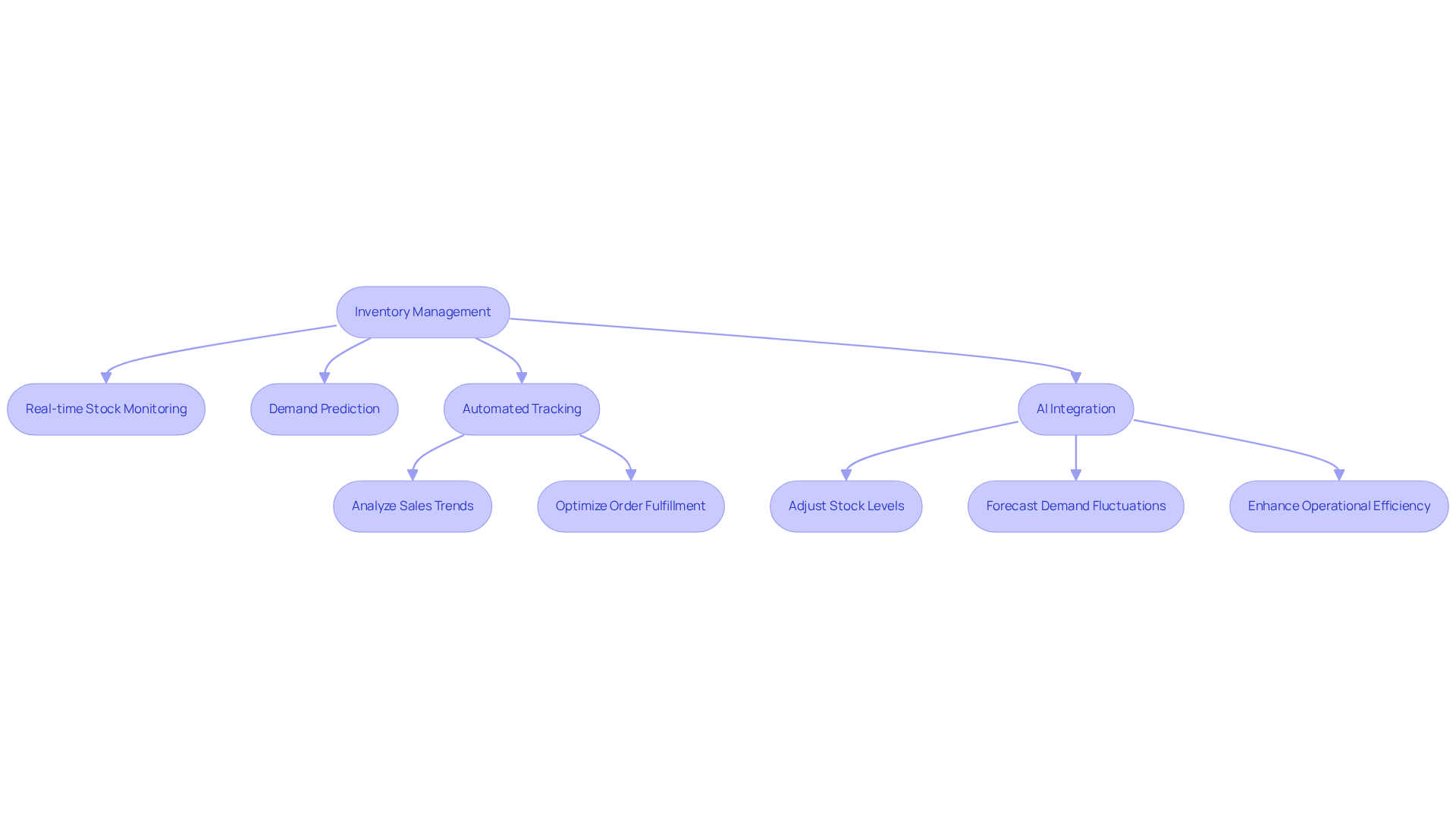
Compliance and Licensing: Navigate Legal Requirements for E-Commerce
Navigating compliance and licensing requirements is crucial for establishments engaging in e commerce wine. Understanding state-specific regulations for direct-to-consumer shipping, age verification, and product labeling is essential. By staying informed about legal requirements, vineyards can avoid costly penalties and ensure smooth operations in their e commerce wine sales efforts.
Moreover, combining these compliance measures with effective direct-to-consumer strategies—such as demand generation and client retention programs—can significantly enhance customer loyalty and stimulate growth. Enocap's comprehensive advisory services are designed to assist vineyards in navigating these complex legal landscapes while crafting compelling brand narratives that resonate with consumers. This approach ultimately secures their future in the competitive wine market.
With our , vineyards have achieved e commerce wine expansion rates as high as 191%, successfully converting casual visitors into devoted patrons.
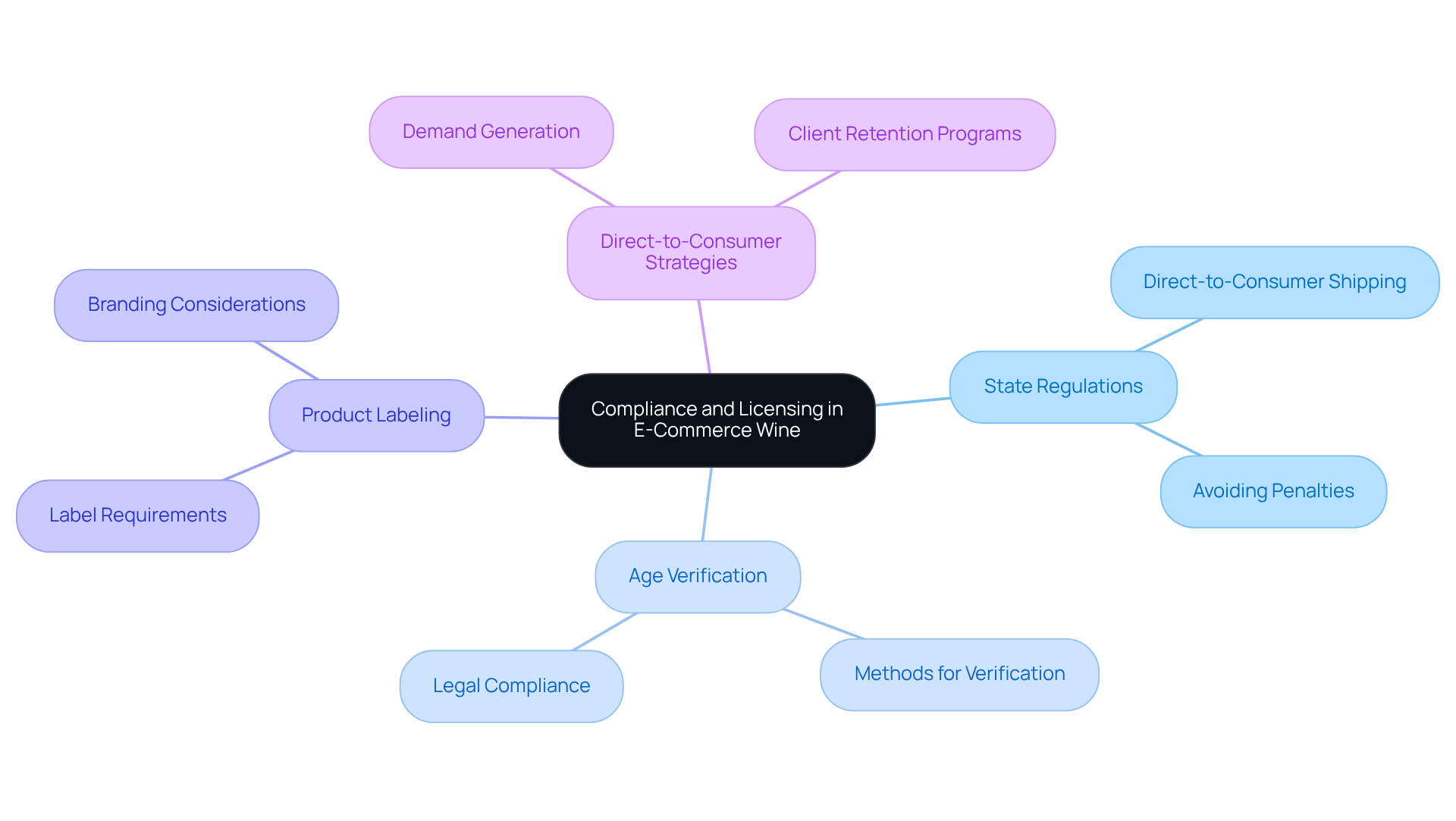
Loyalty Programs: Retain Customers and Encourage Repeat Purchases
Loyalty initiatives serve as a critical strategy for vineyards aiming to retain patrons and stimulate repeat purchases. By providing incentives for purchases, exclusive access to events, and tailored experiences, vineyards can cultivate a robust sense of community and loyalty among their clientele.
Research shows that wineries employing can experience an average increase in repeat purchases, significantly boosting client satisfaction and driving long-term profitability. In fact, loyalty programs have been demonstrated to elevate client retention rates, with members spending 12-18% more annually than non-members.
Furthermore, incorporating personalized incentives tailored to individual preferences can enhance engagement, making clients feel valued and appreciated. As vineyards adapt to the evolving market landscape, leveraging these loyalty strategies will be vital for sustaining growth and maintaining a competitive edge in the wine industry.
Moreover, aligning loyalty programs with strategic financial planning can enhance their effectiveness, ensuring that vineyards not only retain customers but also improve their overall business strategies. By converting casual buyers into dedicated club members through proven methods, wineries can further enrich their brand storytelling, forging deeper connections with their audience and driving sustained growth.
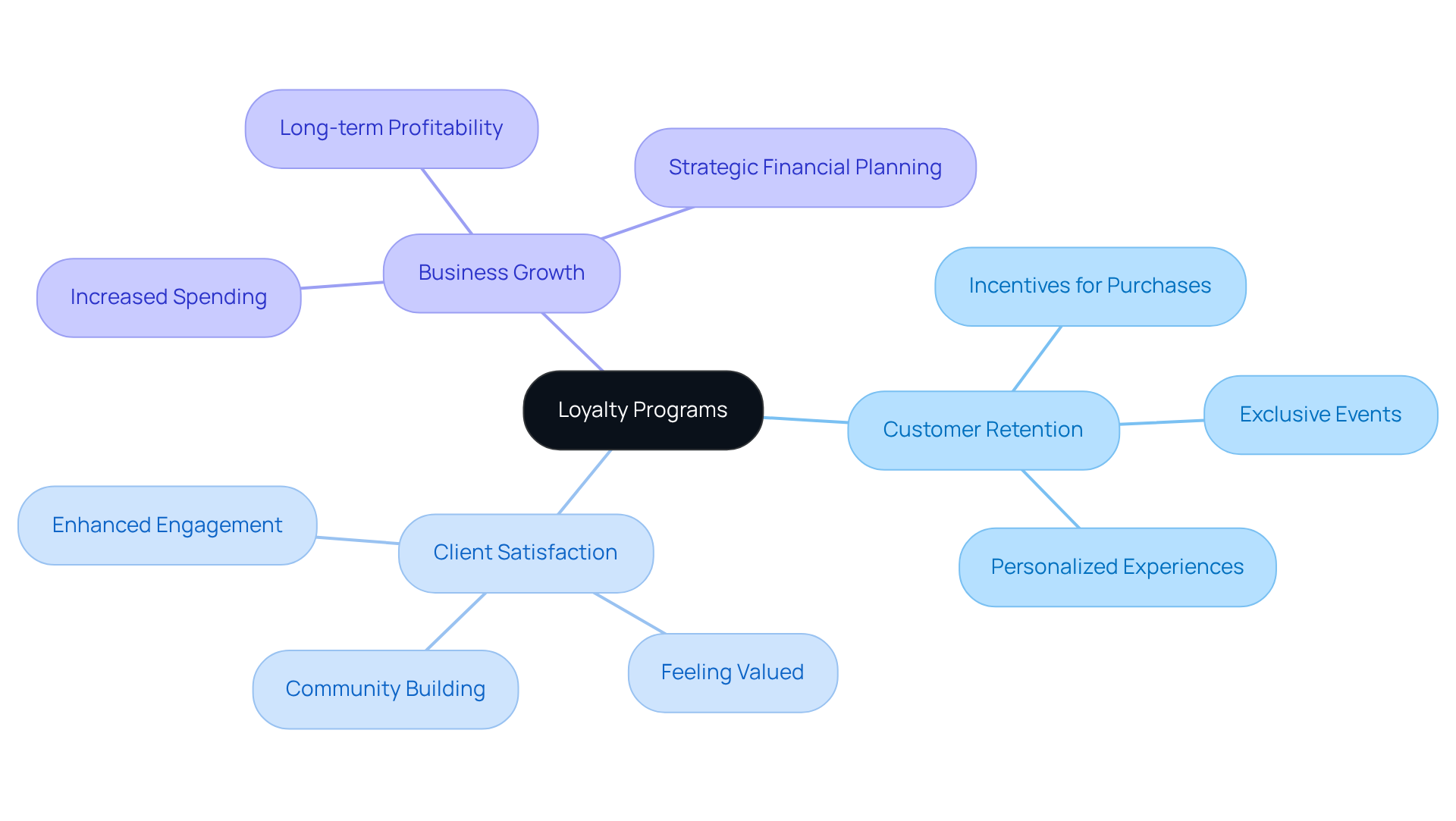
Conclusion
Enocap's innovative approach to direct-to-consumer wine sales underscores the critical role of personalized strategies that not only drive revenue but also cultivate enduring relationships between wineries and their customers. By adopting modern e-commerce solutions and effective marketing tactics, vineyards can convert casual buyers into devoted club members, thereby ensuring sustainable growth in an increasingly competitive market.
The article discusses key strategies such as:
- Leveraging platforms like Commerce7 and WineDirect
- Implementing demand generation techniques
- Enhancing social media presence
- Utilizing targeted email marketing
Each of these components is vital in optimizing the customer experience, increasing visibility, and ultimately boosting e-commerce wine sales. Moreover, the importance of inventory management and adherence to legal requirements cannot be overstated, as they form the foundation of a successful online wine business.
As the e-commerce wine market continues to grow, it is imperative for wineries to embrace these strategies to maintain their competitive edge. By prioritizing customer engagement, customizing experiences, and ensuring operational efficiency, vineyards can not only respond to the demands of today's consumers but also foster a vibrant community around their brand. Adopting these practices will enhance sales and secure a prosperous future for wineries in the digital landscape.
Frequently Asked Questions
What is Enocap and how does it benefit the wine industry?
Enocap is a company that transforms direct-to-consumer sales in the wine sector by implementing customized strategies that enhance brand storytelling and maximize revenue. It empowers producers to connect directly with consumers, turning casual buyers into loyal club members and supporting sustainable growth.
How does Enocap support vineyards in their growth?
Enocap provides strategic capital planning for debt, equity, or acquisition opportunities, helping vineyards thrive for generations. Their proven track record shows significant e-commerce growth for clients, emphasizing the importance of engaging clients through tailored experiences and loyalty initiatives.
What is Commerce7 and what are its key features for vineyards?
Commerce7 is an e-commerce platform designed specifically for vineyards, allowing them to streamline operations and enhance customer experiences. Key features include personalized shopping experiences and advanced product merchandising, which help manage online sales effectively.
How does Commerce7 impact order volume for vineyards?
By leveraging Commerce7, vineyards can significantly reduce friction in the purchasing process, leading to elevated conversion rates. Enocap clients have experienced a remarkable 153% increase in order volume during market expansions.
What trends are impacting e-commerce wine purchases?
E-commerce wine purchases have surged from 1.5 million to 4.1 million recently, with approximately 27% of new wine club registrations coming from digital channels. This trend highlights the importance of adopting modern e-commerce solutions like Commerce7 for producers.
How does WineDirect enhance e-commerce sales for vineyards?
WineDirect provides essential tools to optimize e-commerce wine sales and improve customer engagement. It features user-friendly interfaces and effective marketing strategies, including integrated email marketing and loyalty programs, to attract and retain customers.
Why is client engagement important in e-commerce wine?
Effective client engagement relies on personalized communication and targeted promotions, making platforms like WineDirect crucial for vineyards. This strategy helps cultivate enduring relationships with clientele, driving repeat purchases and amplifying overall sales.
What is the overall goal for vineyards adopting DTC approaches?
By adopting transformative direct-to-consumer approaches and considering strategic capital planning, vineyards aim to establish sustainable channels that foster consistent growth and convert casual purchasers into dedicated club members.




